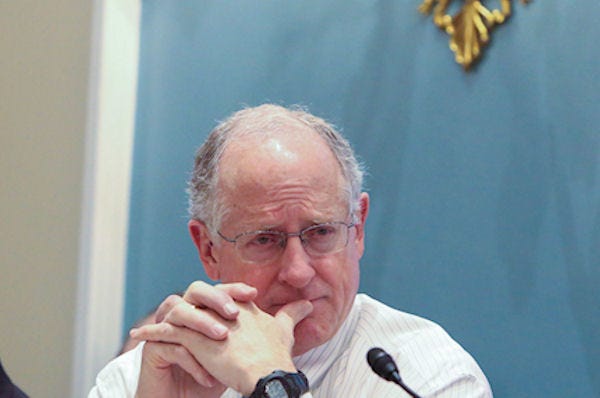
Much noise continues to be made on the controversial Environmental Protection Agency’s (EPA) Waters of the U.S. (WOTUS) regulation.
In the Senate Thursday, Sen. John Hoeven (R-N.D.) proposed an amendment to the Senate's energy and water funding bill for FY 2017 that would block implementation of the WOTUS regulation. The amendment failed 56-42, needing 60 yea votes to be included in the bill.
“The EPA has sought through administrative fiat to seize authority that legally belongs to Congress, not an executive agency. While I am disappointed that the vote failed, I will continue my work to stop this burdensome regulation through the appropriations process,” Hoeven said.

House Agriculture Committee Chairman Michael Conaway was joined by Rep. Dan Newhouse, R., Wash., and a total of 145 house members requesting answers from McCarthy on EPA Region 10’s funding of the whatsupstream.com website and advocacy campaign.
In November, Congress passed a Resolution of Disapproval cosponsored by Hoeven for Waters of the U.S. Such resolutions are authorized under the Congressional Review Act, which allows Congress by majority vote to repeal actions by a federal agency after a rule is formally published and submitted to Congress. Despite passage, however, the measure was vetoed by President Obama in January.
Earlier in the week the House Appropriations Committee did approve the fiscal year 2017 energy and water appropriations bill. The legislation included a policy directive blocking the WOTUS rule.
Last August, U.S. District Court Judge Ralph Erickson issued an injunction blocking the EPA from implementing the WOTUS rule in North Dakota and 12 additional states that had challenged the rule. A subsequent ruling by the 6th U.S. Circuit Court in October blocked the rule from being implemented nationwide while the courts determine its legality.
Thursday the 6th Circuit Court of Appeals in Cincinnati denied petitions to rehear arguments opposing the Clean Water Act. Petitioners want the case to be heard in the District courts rather than beginning in the Federal Appeals court system.
The National Cattlemen’s Beef Assn. (NCBA) was one of the groups requesting the en banc hearing. “We felt the district courts were better suited to hear this initially,” said NCBA spokesman Chase Adams. “This denial certainly wasn’t what we wanted, but doesn’t change the current state of play.”
Petitioners remain hopeful the rule will eventually be overturned.
EPA admitted in news reports that it should not have funded a campaign in Washington State known as whatsupstream.com, due to that campaign’s lobbying of state legislators in contravention of federal law. The whatsupstream.com campaign, which was wholly funded by the EPA, used grant awards to fund a website, radio ads, and billboards depicting dead fish and polluted water, urging individuals to contact their state legislators and, “hold the agricultural industry to the same level of responsibility as other industries.”
Senate Agriculture Committee Chairman Pat Roberts (R-Kan.), and Senate Environment Committee Chairman Sen. Jim Inhofe (R-Okla.), requested an inspector general investigation into the whatsupstream.com ordeal and the EPA inspector agreed to the investigation into the $20.5 million in grants awarded to the Northwest Indian Fisheries Commission.
Earlier this month, the EPA admitted in news reports that it should not have funded a campaign in Washington State known as whatsupstream.com, due to that campaign’s lobbying of state legislators in contravention of federal law. The whatsupstream.com campaign, which was wholly funded by the EPA, used grant awards to fund a website, radio ads, and billboards depicting dead fish and polluted water, urging individuals to contact their state legislators and, “hold the agricultural industry to the same level of responsibility as other industries.”
In a hearing before the Environment and Public Works Committee Tuesday morning, McCarthy admitted that EPA has halted payments to the grant organization due to the concerns the inspector general will be investigating.
“We already know this campaign was malicious,” Roberts said. “Now we need to know what role the EPA had in it and whether they are properly monitoring the lawful use of federal funds.”
Inhofe said the investigation is an important step, but EPA needs to prevent similar mismanagement for occurring in the future.
On the House side, House Agriculture Committee Michael Conaway (R-Texas) was joined by Rep. Dan Newhouse (R-Wash.), and a total of 145 house members requesting answers from McCarthy on EPA Region 10’s funding of the whatsupstream.com website and advocacy campaign.
Conaway said once the IG facts are gathered they’ll look at potential solutions whether that is through the Justice Department or legislatively. He said they’ll continue to push the EPA and work with colleagues to stop the trend or prevent future occurrences.
Conaway said the latest actions by EPA show that this seems to be a trend, rather than an anomaly, for the agency as it continues to misuse taxpayer dollars to promote its own agenda in what appears to be an “intentional and repeated violation” of federal, state and local laws.
About the Author(s)
You May Also Like






